Buried Treasure
Nineteen19
by Justin Sevakis,
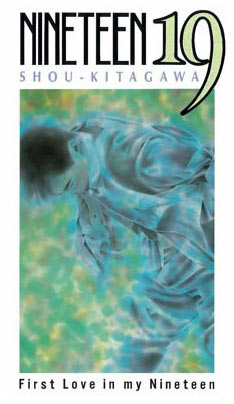 I'm very much a child of 80's pop culture. Especially 80's music and fashion. This is a little strange, since I was born in 1980, and so technically I shouldn't have really been tuned into anything but Saturday morning TV and Nintendo. But tuned in I was. I sat in front of MTV and other shows, fascinated by this strange adult world I saw. A world of big hair and leg warmers. Of big suits and smoke-filled bars. Of women in fishnets dancing in the flash of the red light. And, of course, bad 8-bit video effects.
I'm very much a child of 80's pop culture. Especially 80's music and fashion. This is a little strange, since I was born in 1980, and so technically I shouldn't have really been tuned into anything but Saturday morning TV and Nintendo. But tuned in I was. I sat in front of MTV and other shows, fascinated by this strange adult world I saw. A world of big hair and leg warmers. Of big suits and smoke-filled bars. Of women in fishnets dancing in the flash of the red light. And, of course, bad 8-bit video effects.Of course, this “adult world” had very little to do with reality. I had no idea that the small group of flamboyant dancers were looking on in misery while the director of the music video and the musician took turns doing lines of coke. I had no idea that those flimsy plywood and neon sets weren't real, and that most of America was then actually covered in bad tweed jackets and facial hair. This wasn't my world.
The mood of that period is one I often get nostalgic for, in a way you can only be nostalgic for something you've never really experienced. I yearn for it in a way that most normal people of my generation yearn to wield a light saber: I probably wouldn't know what to do with myself once I'm there, but that doesn't make the fantasy any less intriguing.
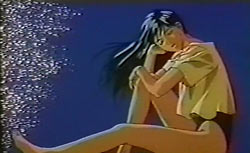 That 80's world of color, music and attractive twenty-somethings did exist, however, in anime form. Having never been a part of the 80's singles scene, the glamorized and romanticized world of anime is potentially much more in tune with what I "experienced" than, say, a John Hughes movie. There's a few notable titles, most of which I'll write about at some point, but the one that most closely resembles my fantasy-tinged memories is a little known OAV called "Nineteen19".
That 80's world of color, music and attractive twenty-somethings did exist, however, in anime form. Having never been a part of the 80's singles scene, the glamorized and romanticized world of anime is potentially much more in tune with what I "experienced" than, say, a John Hughes movie. There's a few notable titles, most of which I'll write about at some point, but the one that most closely resembles my fantasy-tinged memories is a little known OAV called "Nineteen19".Directed by Kōichi Chigira (Brave Story, Phantom Quest Corp.) and based on a long running manga in Young Jump by Shō Kitagawa (another of which, Blue Butterfly Fish, was made into a similarly rare OAV that I'm dying to see), Nineteen19 is a wistful, and surprisingly mature look at one of adolescence's greatest challenge: losing one's virginity. You see, Kubota is just about to graduate high school, and he's the last virgin in his group of friends.
It's not for lack of trying, but truth be known, he's just not all that desperate. He's not the party guy his friends all seem to be, and doesn't have any shoujo manga-esque preconceptions of what his first time should be like. "Just someone pretty is good enough," he muses. Still, he IS nineteen, so it's on his mind. But one night, out at a club, he unexpectedly runs into someone more than just pretty; it's his first (unrequited) love, Masana Fujisaki.
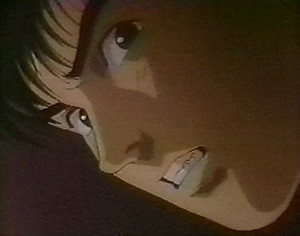 A sexy dance anthem, "Boys (Summertime Love)" by Sabrina, blares. Masana is at the bar, talking to her friends. Kubota sits at the bar, eavesdropping. She's modeling now, and has just broken up with her longtime boyfriend. The friends' reactions are cold and catty. Kubota's blood boils. In a beautifully rendered daydream, he imagines going over there, pounding the table, quashing their harsh words. But he doesn't. The timing isn't right. As he walks away, Masana sneaks a glance back. Minutes later, as he sits in the corner looking dejected, she makes her approach.
A sexy dance anthem, "Boys (Summertime Love)" by Sabrina, blares. Masana is at the bar, talking to her friends. Kubota sits at the bar, eavesdropping. She's modeling now, and has just broken up with her longtime boyfriend. The friends' reactions are cold and catty. Kubota's blood boils. In a beautifully rendered daydream, he imagines going over there, pounding the table, quashing their harsh words. But he doesn't. The timing isn't right. As he walks away, Masana sneaks a glance back. Minutes later, as he sits in the corner looking dejected, she makes her approach.So it didn't go exactly as planned, but he DID get her phone number. The relationship continues like this, full of hestitation and false starts, but unmistakably real. What's so refreshing here (aside from the obvious lack of crass boob jokes) is Masana herself. Aside from being beautiful, she's confident, and quite willing to take charge when Kubota lamely drops the ball. Over the course of the film's 45-minute running time, we see their relationship grow, through these false starts and happy accidents, until it reaches what is perhaps its foregone conclusion. I'll leave it to you to see if Kubota ever gets to go all the way, but I will say that the potential incident is treated with realistic fanfare (i.e. none).
Although the music far more mellow than most late-80's Jpop we're usually treated to (it's nearly jazz-fusion), it's interesting to listen to, and really sets the place. From a pure filmmaking perspective, however, the use of the song "Boys" is breathtaking and lyrical; it's quite possibly the best use of a dance tune in anime that doesn't involve stuff blowing up in space.
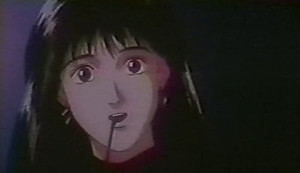 Visually, the film is awash in 80's pop art, courtesy of Madhouse regular Yūji Ikeda (Fushigi Yuugi, X TV). The stylings follow more subdued, music video-style leanings, from framings and creative matte work to mist filters. It's seldom that animation pays this much attention to lighting, but here it's almost used as a Greek chorus -- not over-the-top enough to be distracting, but adding a surreal undercurrent to the proceedings. Despite its exquisite attention to detail (the backgrounds are nearly photorealistic at times), its also not above diving into a quick SD Grafitti montage. The manager at the café where Kubota has a part-time job makes for some quick slapstick moments, as he can't keep his hands to himself. The associated visuals are priceless. Animation direction and character designs are by Naoyuki Onda (Gantz, Ai no Kusabi, and animation director for Wolf's Rain), whose sensual designs and attention to fine subtleties in character movement achieve levels of quality usually reserved for high-budget movies. I consider him to be one of anime's most undervalued talents.
Visually, the film is awash in 80's pop art, courtesy of Madhouse regular Yūji Ikeda (Fushigi Yuugi, X TV). The stylings follow more subdued, music video-style leanings, from framings and creative matte work to mist filters. It's seldom that animation pays this much attention to lighting, but here it's almost used as a Greek chorus -- not over-the-top enough to be distracting, but adding a surreal undercurrent to the proceedings. Despite its exquisite attention to detail (the backgrounds are nearly photorealistic at times), its also not above diving into a quick SD Grafitti montage. The manager at the café where Kubota has a part-time job makes for some quick slapstick moments, as he can't keep his hands to himself. The associated visuals are priceless. Animation direction and character designs are by Naoyuki Onda (Gantz, Ai no Kusabi, and animation director for Wolf's Rain), whose sensual designs and attention to fine subtleties in character movement achieve levels of quality usually reserved for high-budget movies. I consider him to be one of anime's most undervalued talents.The story is capped off by a wonderful Engrish quote: "My first love... In my Nineteen."
Nineteen19 is a reflection on a simpler time, on youth, and first loves. It's a rare, fashionably-idealized look at what it means to be a single guy, and a window on a world and a pop culture that doesn't exist anymore, if it ever really existed at all.
On one of my many late-night Wikipedia and YouTube tangents the other day, I learned that Baltimora, the synth-pop singer behind the 1986 hit “Tarzan Boy” died in 1995 of AIDS. God, I hate the real world.
| Obscure-O-Meter™ | |
| A | Abundant. Available anywhere that carries anime. |
| C | Common. In print, and always available online. |
| R1 | US release out of print, still in stock most places. |
| R2 | US release out of print, not easy to find. |
| R3 | Import only, but it has English on it. |
| R4 | Import only. Fansubs commonly available. |
| R5 | Import only, and out of print. Fansubs might be out there. |
| R6 | Import long out of print. No fansubs are known to exist. |
| R7 | Very rare. Limited import release or aired on TV with no video release. No fansubs known to exist. |
| R8 | Never been on the market. Almost impossible to obtain. |
| Adapted from Soviet-Awards.com. | |
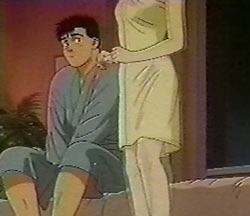 How to get it:
How to get it:This is one of the more rare anime in my collection: I have no data on any release outside of its initial LD/VHS run back in 1990 in Japan. It's never been licensed (possibly due to music rights issues), or even reissued to my knowledge. I can't even find a catalog number for the LD. I think the licensor is Shueisha, but there's an outside chance it's JVC. The only fansub I'm aware of was a VHS sub produced long before their Big Boom in the mid 90's. This means your chances of finding a copy are extremely slim. I wonder if a VHS rip will show up online somewhere.
I hate writing about anime people have no chance of seeing; I feel like a tease.
Screenshots ©Shō Kitagawa • Shueisha.
discuss this in the forum (36 posts) |
